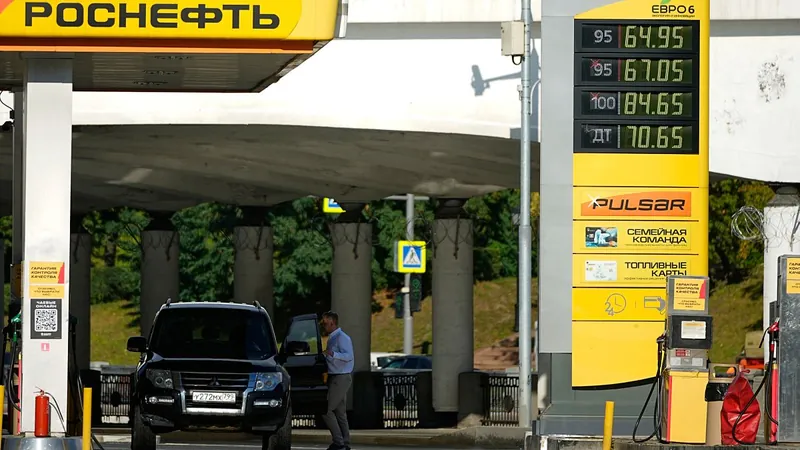
Ukraine's Strikes on Russian Oil Industry: A Game Changer in the War
2025-09-19
Author: Ken Lee
Ukraine Targets Russian Oil Industry with Precision Strikes
In a bold nighttime operation, Ukraine has targeted one of Russia's largest oil refineries located in Bashkortostan, a staggering 1,300 kilometers from the front lines of the ongoing conflict. Simultaneously, their Special Operations Forces launched a strike on a critical oil facility in Volgograd, a mere 450 kilometers from the combat zone.
Striking at the Core of Russia's Military Supply Chain
The Volgograd refinery holds particular significance as it is the largest producer of petroleum products in Russia's Southern Federal District, processing an impressive 15.7 million metric tons of crude oil each year. This facility is pivotal for supplying fuel to the Russian military, making it a strategic target for Ukrainian forces.
In recent weeks, Ukraine has ramped up its precision attacks on Russian oil infrastructure, which have already led to operational halts and triggered alarming fuel shortages throughout Russia. Reports indicate that these strikes have shut down facilities responsible for at least 1.1 million barrels per day, representing roughly 17% of Russia’s oil processing capacity.
Economic Ramifications for Russia's War Efforts
Vladislav Inozemtsev, a Russian economist, expressed to Euronews that Ukraine's strategy to disrupt the oil sector is "the most efficient way to weaken Russia’s war machine." The Russian economy relies heavily on oil and gas revenues, with oil exports constituting around a third of the federal budget.
Inozemtsev emphasized the long-term impacts of these strikes, pointing out that attacking oil refineries causes far more disruption than damaging drone manufacturing sites, which are relatively quick to repair.
Fuel Shortages and Public Discontent
As Ukraine’s strikes continue, fuel shortages have begun to plague central Russia, with motorists facing long lines and some gas stations completely running dry. The situation is dire enough that officials have had to resort to rationing and cutting off sales altogether. This nationwide fuel crisis has resulted in record-high prices, dramatically affecting daily life for many Russians.
Inozemtsev noted that the lack of petrol is now one of the primary irritants for the Russian populace, alongside airport closures and internet disruptions. He remarked, "When people see that there is nothing at the petrol station, it strikes at the core of their daily lives."
Moscow's Struggle to Respond
Despite being the world’s second-largest oil exporter, Russia’s oil industry faces considerable challenges, exacerbated by Ukrainian drone strikes and seasonal demand increases. In light of these shortages, the Russian government has suspended gasoline exports until September 30 and imposed partial bans to manage the crisis.
Looking ahead, discussions are underway in Moscow about investing in missile defense systems and anti-drone measures, which could divert critical resources away from the economy and further exacerbate financial struggles.




 Brasil (PT)
Brasil (PT)
 Canada (EN)
Canada (EN)
 Chile (ES)
Chile (ES)
 Česko (CS)
Česko (CS)
 대한민국 (KO)
대한민국 (KO)
 España (ES)
España (ES)
 France (FR)
France (FR)
 Hong Kong (EN)
Hong Kong (EN)
 Italia (IT)
Italia (IT)
 日本 (JA)
日本 (JA)
 Magyarország (HU)
Magyarország (HU)
 Norge (NO)
Norge (NO)
 Polska (PL)
Polska (PL)
 Schweiz (DE)
Schweiz (DE)
 Singapore (EN)
Singapore (EN)
 Sverige (SV)
Sverige (SV)
 Suomi (FI)
Suomi (FI)
 Türkiye (TR)
Türkiye (TR)
 الإمارات العربية المتحدة (AR)
الإمارات العربية المتحدة (AR)